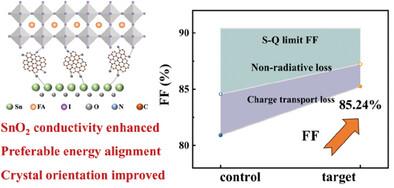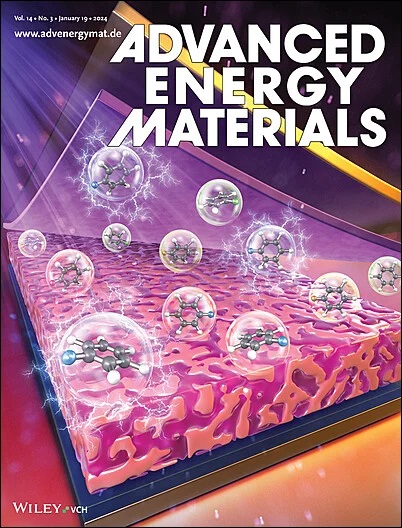Interfacial Bridging Enables High Performance Perovskite Solar Cells with Fill Factor Over 85%
IF 24.4
1区 材料科学
Q1 CHEMISTRY, PHYSICAL
引用次数: 0
Abstract
The power conversion efficiency (PCE) of perovskite solar cells (PSCs) is approaching their Shockley-Queisser (S-Q) limit through numerous efforts in key parameters improvement. To further approaching the limit, it is important to facilitate the fill factor (FF), a parameter closely related to carrier transport and nonradiative recombination. Herein, an interfacial bridging strategy is proposed to improve FF, which utilizes functional graphene quantum dots at the tin oxide (SnO2)/perovskite buried interface. As a result, synergistic effects of enhanced conductivity of SnO2, preferable energy alignment at the buried interface and improved perovskite crystal orientation are realized. The champion FF reaches 85.24% in formamidinium lead iodide (FAPbI3) based PSCs, which ranks among the highest in the n-i-p structure. Such strategy is also proven successful in other perovskite systems, where the champion PCE reaches 24.86% in the formamidinium-cesium (FACs)-based devices and 24.44% in the flexible devices. Therefore, this work provides a practical design rule for pursuing high FF of PSCs with carbon materials.

界面桥接实现了填充因子超过 85% 的高性能 Perovskite 太阳能电池
通过不断改进关键参数,包晶体太阳能电池(PSCs)的功率转换效率(PCE)已接近肖克利-奎塞尔(S-Q)极限。为了进一步接近极限,必须提高填充因子(FF),这是一个与载流子传输和非辐射重组密切相关的参数。本文提出了一种提高填充因子的界面桥接策略,即在氧化锡(SnO2)/过氧化锡埋藏界面上利用功能石墨烯量子点。因此,实现了增强二氧化锡导电性、在埋藏界面上优化能量排列和改善过氧化物晶体取向的协同效应。在基于甲脒碘化铅(FAPbI3)的 PSC 中,冠军 FF 达到 85.24%,在 ni-p 结构中名列前茅。这种策略在其他包晶石系统中也被证明是成功的,在基于甲脒铯(FACs)的器件中,冠军 PCE 达到 24.86%,在柔性器件中达到 24.44%。因此,这项工作为利用碳材料追求 PSC 的高 FF 提供了实用的设计规则。
本文章由计算机程序翻译,如有差异,请以英文原文为准。
求助全文
约1分钟内获得全文
求助全文
来源期刊

Advanced Energy Materials
CHEMISTRY, PHYSICAL-ENERGY & FUELS
CiteScore
41.90
自引率
4.00%
发文量
889
审稿时长
1.4 months
期刊介绍:
Established in 2011, Advanced Energy Materials is an international, interdisciplinary, English-language journal that focuses on materials used in energy harvesting, conversion, and storage. It is regarded as a top-quality journal alongside Advanced Materials, Advanced Functional Materials, and Small.
With a 2022 Impact Factor of 27.8, Advanced Energy Materials is considered a prime source for the best energy-related research. The journal covers a wide range of topics in energy-related research, including organic and inorganic photovoltaics, batteries and supercapacitors, fuel cells, hydrogen generation and storage, thermoelectrics, water splitting and photocatalysis, solar fuels and thermosolar power, magnetocalorics, and piezoelectronics.
The readership of Advanced Energy Materials includes materials scientists, chemists, physicists, and engineers in both academia and industry. The journal is indexed in various databases and collections, such as Advanced Technologies & Aerospace Database, FIZ Karlsruhe, INSPEC (IET), Science Citation Index Expanded, Technology Collection, and Web of Science, among others.
文献相关原料
| 公司名称 | 产品信息 | 采购帮参考价格 |
|---|
 求助内容:
求助内容: 应助结果提醒方式:
应助结果提醒方式:


